Workers’ Rights Event
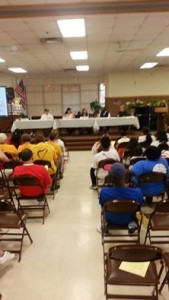
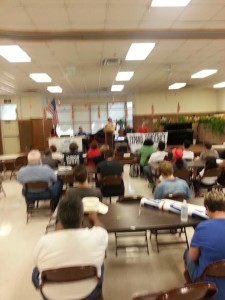 The Dallas Workers’ Rights Board hearing this fall brought hope and challenge.
The Dallas Workers’ Rights Board hearing this fall brought hope and challenge.
The Workers Defense Project, one of the organizations in collaboration with the Dallas Workers’ Rights Board, has achieved many victories. Among these are recovering more than a million dollars in back wages for low-wage workers, training thousands of low-wage workers about their employment rights, monitoring construction sites to ensure fair working conditions and workers’ compensation, contributing to the creation of a nationwide safety program for workers, and co-founding the Austin Immigrant Rights Coalition.
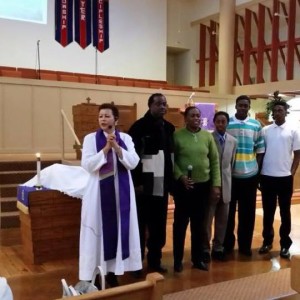
Rev. Diana Masters, pastor of Warren United Methodist Church, challenged all of us gathered at the Workers’ Rights hearing to be voices for voiceless workers who suffer injustices. Throughout her talk she connected unjust treatment of workers today with the Egyptian Pharoah’s ordering the Israelites to make bricks with no straw (Exodus 5:6-18). “There are many Pharoahs today,” she said. These current-day Pharoahs make people produce products without the resources they need. Current-day Pharoahs make people work every day without healthcare, without needed equipment, without fair wages. Many people work 55 hours or more a week without minimum wages and benefits. “Our society continues to ask people to make bricks with no straw,” Diana said. “That’s why we need to stand up for them and work in solidarity with them.”

Herb Keener, from the Communications Workers of America (CWA) labor union, spoke on the pay gap between CEOs and workers and the connection between racial and economic injustice. He referred to the book Runaway Inequality: An Activist’s Guide to Economic Justice by Les Leopold. In 1970 in the US, the ratio of pay between the top 100 CEOs and the average worker was 45 to 1. Today it is 829 to 1. Herb also illustrated the intersection of racism and economic injustice. A Pew Research Center study revealed the disparity in wealth (household median net worth) by race and ethnicity: white—$141,900; African American—$11,000; Hispanic—$13.700.  Even without finishing high school, whites on average have more wealth than African Americans or Latinos/as with college degrees.
Even without finishing high school, whites on average have more wealth than African Americans or Latinos/as with college degrees.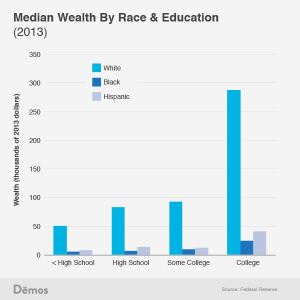

Dallas attorney Victoria Neave brought hope and challenge together in her talk. Growing up in the barrio in Pleasant Grove, she became the first member of her family to graduate from college. Her dad came to the US as an immigrant with a sixth grade education and a dream of a better life for his family. Victoria says she received this message from him: never forget where you came from. In high school she became involved in civil rights advocacy groups, including League of United Latin American Citizens (LULAC). She went to law school so she could fight for justice in the courts. At Texas Southern University Thurgood Marshall School of Law, Victoria worked for comprehensive immigration reform. She started her own law firm and serves in community groups to continue to stand up for those without a voice. She is Vice President of the Board of La Voz del Anciano which serves the elderly population of Dallas and serves on the board of the Dallas Hispanic Bar Association. She is currently running for Texas State Representative, hoping to have the opportunity to write legislation and advocate for laws that benefit working families. At the Workers’ Rights hearing she spoke about raising wages, especially working for equal pay for women. She lamented the inequities in women’s wages: white women make 79 cents for every dollar made by white men; African Americans women make only 59 cents for every dollar made by white men; Latina women make only 44 cents for every dollar made by white men. Also, Victoria spoke about expanding Medicaid that would also add thousands of jobs, and increasing funds for the college education of low-income students. Education, she said, helped her out of poverty, and so she wants to make education available for everyone.
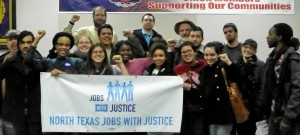 The Dallas Workers’ Rights Board also collaborates with North Texas Jobs with Justice to bring change that benefits workers by combining communications strategies and solid research and policy advocacy with grassroots actions and mobilization. Jobs with Justice brings together labor, community, student, and faith voices to improve workers’ lives and shape the public discourse on workers’ rights and the economy.
The Dallas Workers’ Rights Board also collaborates with North Texas Jobs with Justice to bring change that benefits workers by combining communications strategies and solid research and policy advocacy with grassroots actions and mobilization. Jobs with Justice brings together labor, community, student, and faith voices to improve workers’ lives and shape the public discourse on workers’ rights and the economy.
Wow, that is hopeful!! I can’t BELIEVE the wage gap between ethnicities- what in the world!?